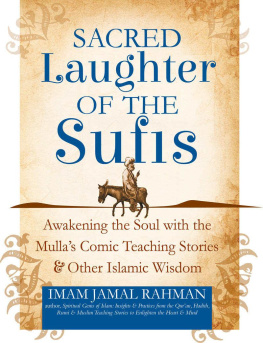Abu Abd al-Rahman al-Sulami - Infamies of the Soul and Their Treatments
Here you can read online Abu Abd al-Rahman al-Sulami - Infamies of the Soul and Their Treatments full text of the book (entire story) in english for free. Download pdf and epub, get meaning, cover and reviews about this ebook. year: 2018, publisher: Islamosaic, genre: Science. Description of the work, (preface) as well as reviews are available. Best literature library LitArk.com created for fans of good reading and offers a wide selection of genres:
Romance novel
Science fiction
Adventure
Detective
Science
History
Home and family
Prose
Art
Politics
Computer
Non-fiction
Religion
Business
Children
Humor
Choose a favorite category and find really read worthwhile books. Enjoy immersion in the world of imagination, feel the emotions of the characters or learn something new for yourself, make an fascinating discovery.
- Book:Infamies of the Soul and Their Treatments
- Author:
- Publisher:Islamosaic
- Genre:
- Year:2018
- Rating:4 / 5
- Favourites:Add to favourites
- Your mark:
- 80
- 1
- 2
- 3
- 4
- 5
Infamies of the Soul and Their Treatments: summary, description and annotation
We offer to read an annotation, description, summary or preface (depends on what the author of the book "Infamies of the Soul and Their Treatments" wrote himself). If you haven't found the necessary information about the book — write in the comments, we will try to find it.
Infamies of the Soul and Their Treatments — read online for free the complete book (whole text) full work
Below is the text of the book, divided by pages. System saving the place of the last page read, allows you to conveniently read the book "Infamies of the Soul and Their Treatments" online for free, without having to search again every time where you left off. Put a bookmark, and you can go to the page where you finished reading at any time.
Font size:
Interval:
Bookmark:
In the Name of Allah, Most Merciful and Compassionate
Infamies of the Soul and Their Treatments (Uyub al-nafs wa adwiyatuha) is one of the earliest manuals on the purification of the soul. It remains widely read within the Muslim world until today. Its author is Imam Abu Abd al-Rahman Muhammad ibn al-Husayn ibn Muhammad al-Sulami (325412 AH/9371021 CE). Imam Abu Abd al-Rahman al-Sulami has authored over one hundred works. He is most famous for his works related to spiritual development and its masters, though he was also an accomplished scholar of the Shafii school of law, a hadith narrator, and a historian.
This book, Infamies of the Soul, contains sixty-nine infamies (wicked traits or actions) along with their treatments. The text includes many reports attributed to the Prophet (may Allah bless him and give him peace), his Companions (may Allah be pleased with them), the Successors, and others from the Pious Forbears (may Allah grant them all His mercy). Many of these reports are mentioned along with their chain of transmission. The chains and attributions are not always authentic, though the contents of the report tend to be accepted.
There are numerous editions of the book published in Arabic. I first learned about the book when I received a copy from Sheikh Amin al-Faruqi (may Allah protect him) who had prepared and annotated an edition that was published in Damascus by Dar Maktabat al-Beiruti repeatedly in the mid-1990s. It was also published in Cairo in 1401/1981 by Dar al-Shuruq. It was published along with Ahmad al-Zarruqs versification in Beirut in 2010 by Dar al-Kutub al-Ilmiyyah. Etan Kohlberg published a critical edition in Jerusalem in 1976. Unfortunately, there is a great deal of variation between the editions which can confuse, distort, and change the meaning of the text.
I relied on Sheikh Amins edition for my first draft translation, which I then corrected against Kohlbergs and other editions. Aside from striving for an accurate translation of the text, I have also tried to track down the earliest sources for every quotation in the book, and I advise readers to consult the notes when quoting the book.
Where I have succeeded, it is only through the grace of Allah; where I have faltered it is from my own shortcomings. May Allah forgive the author, everyone mentioned in the book, its owners, readers, listeners, and all Muslims living and dead.
Musa Furber
Kuala Lumpur
November 8, 2018
All praise belongs to Allah, first and last. May the blessings of Allah outwardly and inwardly always be upon Muhammad and his folk, and many salutations.
All praise belongs to Allah who taught His elect [devotees] the infamies [bad qualities or wicked deeds] of their souls. He honored them with becoming acquainted with the treacheries of the soul, and He bestowed upon them awareness and attentiveness of the states that pass over it. He granted them success in remedying the souls infamies and concealed evils, using remedies hidden [to all] except the attentive, resulting from their knowledge of the souls sicknesses and busying themselves with remedies. And by this He thus made what is difficult easy for them, by His grace and success.
To proceed:
Some of the scholars (may Allah honor them with [acts of] obedience to Him) asked me to gather details about the infamies of the soul that can then be used to infer what [lies] behind it. I answered their request and gathered these details for him (And I ask Allah Most High that He not deprive us of their blessings!) after beseeching Allah for guidance and success. He is my sufficiency and what a wonderful helper! May the peace of Allah be upon Muammad, his folk and companions, and [His] many blessings.
So I say:
Know that the soul is of three types: the one that incites evil [ammarah], the reproachful soul [lawwamah], and the one that is serene [mutmainnah].
The serene soul is certain that Allah is its Lord, has found serenity in what Allah has promised, deemed true what Allah Most High has said, and is patient with His command. It is the faithful soul that Allah Most High has made luminous, has put its book [of deeds] into its right hand, and has purified. It is the soul that is content with the decree of Allah and its destiny: good and evil, beneficial and harmful. It is the soul to which Allah Most High says, Return to your Lord pleased with Allah and pleasing (Q89:28) to others due to its righteous deeds and attesting the promise of Allah Most High.
The second [type of soul] is the reproachful soul. It reproaches good and evil, and is impatient [whether] things are easy or difficult. It regrets what it has missed and reproaches for [missing] it, saying, If only I had done such-and-such, or If only I had not done such-and-such. It is the immoral and rejected soul. Whenever this soul is dutiful or immoral it reproaches: if it does a good deed it says, Why didnt I do more?, and if it does an evil deed it says, If only I had not done that! It reproaches itself in the Afterlife for squandering this life. It is the soul by which Allah Most High swore when He said, And I shall swear by the reproaching soul (Q75:2).
[The third is] the soul that incites evil, the one concerning which Allah Most High when conveying [the story of] Yusf (peace be upon him) said, The soul does indeed incite to evil (Q12:53), [and elsewhere] and curbed their souls passions (Q79:40), Do you see he who has taken his passion for his god? (Q45:23), and other verses which indicate the evils of the soul and its little desire for good.
Ali ibn Amr informed us, saying: Abd al-Jabbar ibn Sirin informed us, saying: Ahmad ibn Hasan ibn Aban informed us, saying: Abu Asim informed us, saying: Shubah and Sufyan informed [us] from Salmah ibn Kuhayl: from Abu Salamah from Abu Hurayra (may Allah be pleased with him): the Prophet (may Allah bless him and give him peace) said: Tribulation, caprice, and lust are kneaded in the clay [constitution] of the sons of Adam.
Allah Most High says, And strive for Allah with the striving due to Him (Q22:78) meaning striving against the soul and preventing it from following caprice.
Expecting Salvation Despite Violations
Among the infamies of the soul is its imagining that it is standing at the door of salvation, knocking with various litanies and good deeds while the door is open yet it has shut the door of returning [to the truth] on itself through numerous violations.
Al-Husayn ibn Yahya informed me, saying: I heard Jafar ibn Muhammad say: I heard Masruq say:
Rabia al-Adawiya passed by the assembly of Salih al-Murri while Salih was saying, Whoever persists in knocking on the door is on the verge of the door opening for him. Rabia said, The door, O underminer, is open but you flee from it! How can you reach a goal when you mistook its path from the first step?
So how can the slave escape the infamies of the soul when he is the one who pursues passions for it? Or how can one escape from chasing whims when he does not hold back from violations?
I heard Muhammad ibn Ahmad ibn amdan say: I heard Muhammad ibn Ishaq al-Thaqafi say: I heard Ibn Abi al-Dunya say, One of the sages said, Do not expect to sober up while you have an infamy. And do not expect salvation while you have a sin [against you].
This condition is treated by what Sari al-Saqti said: [by] traveling the path of guidance, wholesome nourishment, and complete protection [from Allah].
Comfort By The Form Of Repentance
Among the infamies of the soul is that it is relieved and comforted whenever it cries.
Font size:
Interval:
Bookmark:
Similar books «Infamies of the Soul and Their Treatments»
Look at similar books to Infamies of the Soul and Their Treatments. We have selected literature similar in name and meaning in the hope of providing readers with more options to find new, interesting, not yet read works.
Discussion, reviews of the book Infamies of the Soul and Their Treatments and just readers' own opinions. Leave your comments, write what you think about the work, its meaning or the main characters. Specify what exactly you liked and what you didn't like, and why you think so.













